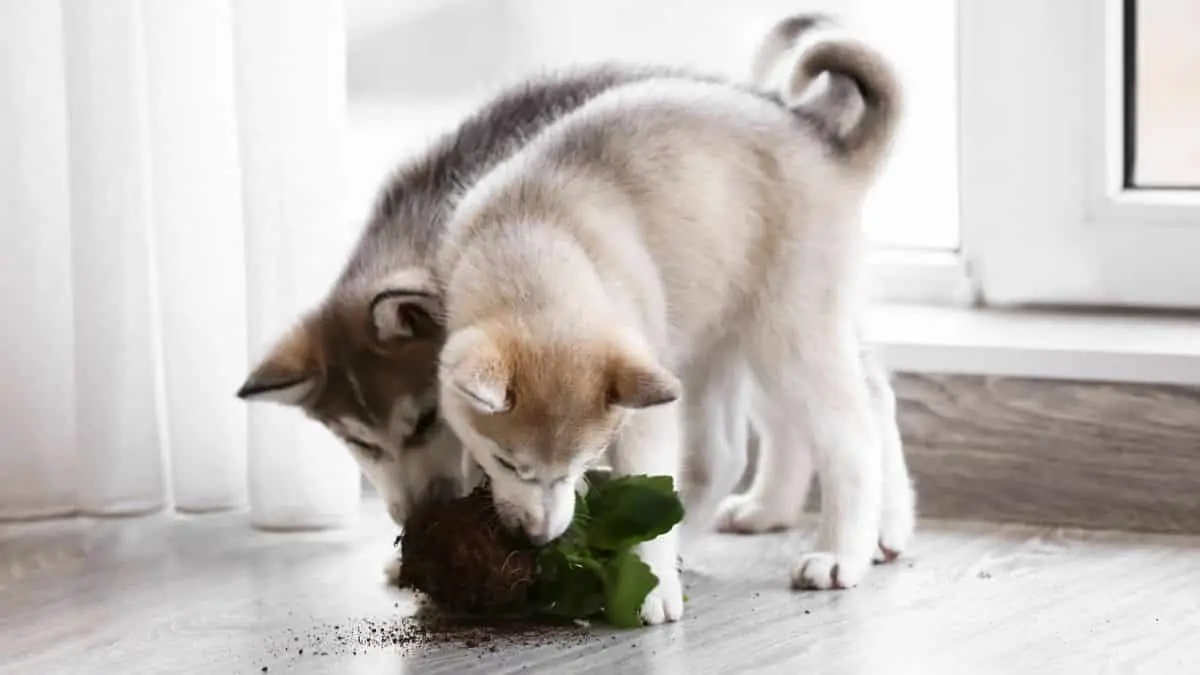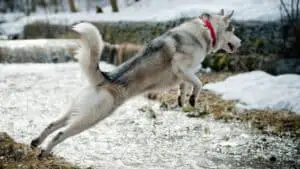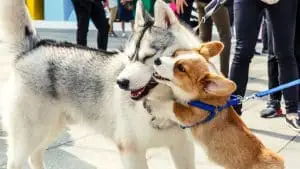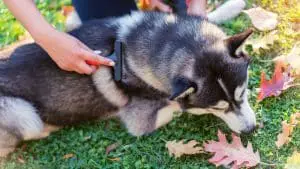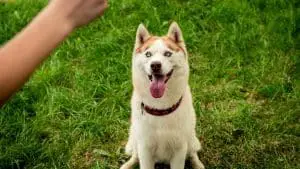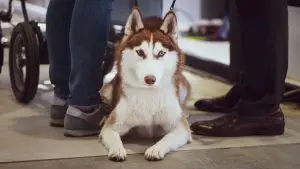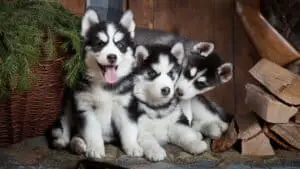How to Stop Siberian Huskys Chewing: Everything You Need to Know (incl. FAQ)
Just as babies tend to gnaw and chew as their teeth are growing in, so too will your Siberian Husky puppy. All new Husky owners should know that your puppy’s chewing is completely natural. In fact, it can actually help your Husky puppy develop properly. However, if you are unable to control this chewing, it can lead to some seriously destructive behavior.
Firstly, you should know that it is entirely normal for puppies to chew when they are teething. Not only does it help puppies alleviate some of the pain and discomfort of the teething process, but it also helps them explore their surroundings. As Huskies age, they will continue this chewing behavior, but hopefully – with the right training – they will direct their chewing habits to more productive avenues!
As your Husky will begin his chewing journey when he is just a pup, it is important to lay down good habits in these formative years. While they are still young and eager to learn, it is much easier to put a stop to excessive and destructive chewing. By observing his behavior and mood, providing suitable chew toys, and teaching him proper behaviors, it is possible to limit the damage caused by chewing and gnawing.
Table of Contents
Can chewing be good?
Although you might think that the holes in your shoes beg to differ, chewing can be a healthy behavior in dogs – both puppies and adults alike.
In puppies, chewing is a sign that their adult teeth are growing in and is also a means of helping them explore their environment.
In adults, chewing can help maintain a strong jaw, healthy gums, and clean teeth.
If you are able to train and direct your Husky to chew the right things, this entirely normal behavior can actually help him live a longer and happier life.
When your Husky starts displaying signs of mindless chewing, however, do not think that it is just a passing phase. On the contrary, if left unchecked, this destructive chewing can get much worse.
Provide your Husky with plenty of chew toys and alternatives to your couch! Make sure you positively reinforce correct chewing behavior and immediately stop any negative chewing behavior as soon as you notice it, such as when you see your pup with your shoe in his mouth, or when he is attempting to take a bite out of the armchair!
When putting a stop to the unnecessary and negative chewing do not shout or employ physical abuse. A simple, firm, loud ‘no!’ will often suffice.
No matter how angry you get when he has chewed on your valuables, never direct this anger at your Siberian, as it could produce very negative effects.
Why your Husky chews
As with any dog, chewing in Siberian Huskies can occur for a number of reasons.
Boredom is often behind many instances of destructive chewing behavior in dogs. In this situation, you should try and keep your dog busy. Make sure you provide enough activities for him to engage in, especially if you value your shoes and your furniture!
In other circumstances, chewing can also be attributable to teething problems. When your dog is teething, it is often helpful to provide him with something else to gnaw at, as there is often an uncontrollable urge to chew when your puppy’s deciduous teeth are falling out.
Tipp: A frozen washcloth can be soothing and pleasant for your pup and can help instill some good teething habits. If your Husky knows that a nice, cool chew toy is on the horizon, then he will be much less likely to engage in the bad habit of chewing up your furniture instead!
Can I redirect my Husky’s chewing?
Chewing in dogs is inevitable. It is normal, healthy behavior that shouldn’t be discouraged. If you want to save your shoes and your furniture and ensure that your home and belongings are puppy-proofed, you will need to provide your dog with chew toy alternatives and redirect his behavior to more productive (and less destructive!) avenues.
Invest in some robust and appealing chew toys. Whether you choose Kongs, squeakers, or even soft chew toys will depend entirely upon your dog and his preferences. You will soon notice which of your Husky’s chew toys are his favorites!
Just as is the case with any type of Husky training, you will have to be firm and consistent when it comes to redirecting your Husky’s chewing. If you ever see him chew on a piece of furniture, other objects, or items of clothing, remove it from him with a firm ‘no!’ and give him his permitted chew toy instead.
You can also try and encourage good behavior by exchanging a non-permitted chew toy (your favorite pair of shoes perhaps?) for a treat. Encourage your pup to give up your belongings in exchange for some kibble or other yummy treats.
When dealing with chewing, think of redirecting the chewing rather than stopping it completely. If you try to put a complete stop to it you will end up very frustrated. Instead of trying to deter your dog from chewing, simply give him something appropriate to chew on.
When training him not to chew on your valuables praise and reward him when he chews on the appropriate items. Then he will stick to chewing his chew toys. You must be consistent and ensure that he chews on his chew toys only rather than letting him chew on other things sometimes.
Frequently Asked Questions
Is it normal for my Husky puppy to be chewing things?
Have you noticed that your Husky puppy has started to develop a taste for, well, everything?! If so, there is no need to worry. Chewing is one of the most common and normal behaviors in dogs.
This is especially true when it comes to puppies. Not only will your puppy chew objects to help with the discomfort caused by teething, but he will also chew objects simply to see what they are!
A note about puppies: although chewing and gnawing might be a common behavior, that doesn’t mean you should simply allow it to occur. If you don’t train your puppy to learn what he can and can not chew, it can lead to behavior issues later on.
How can I stop my Husky dog from chewing everything?
There are a couple of common methods that can be employed to help stop your dog from chewing everything in sight!
If you are familiar with the basics of dog training, then you will know the principles of positive reinforcement and the importance of actively encouraging good behavior, while not acknowledging naughty behavior.
If you notice your dog engaged in destructive behavior, such as chewing on furniture or other belongings, interrupt him with a loud noise. Offer him an alternative chew toy, and lavish praise and pats upon him when he starts to play with the chew toy.
Another alternative is the use of a taste deterrent. If you make the ‘taste’ of important items (such as furniture, shoes, clothing, and other belongings) unappealing to your dog, he will be less likely to chew them.
If you do use a taste deterrent, make sure you observe your dog closely, as he may start chewing or gnawing at the item in question before he’s registered the yucky taste! It is also important to regularly reapply these deterrents.
How can I prevent my dog from chewing while I’m away from home?
Taste deterrents, when used properly, can help set your mind at ease when it comes to leaving your Husky pup at home for longer time periods. Of course, there are other ways you can stop your dog from chewing all your furniture, and some of them have very little to do with actually chewing!
Keep your Husky mentally and physically stimulated. Some chewing can arise out of boredom, and one of the best ways to ensure that your dog is not bored is by regularly getting him out of the house for a bit of exercise.
Ensure your dog knows where his toys are, and even try and make use of dedicated chew toys such as Kongs. These toys ensure that your dog is rewarded and positively reinforced for chewing the right things, even when you aren’t there.
Finally, if there are certain items that you don’t want your dog to turn into an ad hoc chew toy, make sure they are out of his reach when you aren’t able to supervise him. This limits chewing objects for him to destroy, and keeps you both happy in the long run!
Why do dogs chew?
Chewing is an entirely normal behavior in dogs. Whether they are puppies that are getting used to the feel of their adult teeth growing in, juveniles exploring the world around them, or adult dogs that are trying to keep their jaw and teeth healthy, there are a number of reasons your dog wants to chew and gnaw!
Where this behavior becomes negative and destructive is when your pup decides to start chewing on some of your beloved items! This can happen as a result of poor training, not having chew toy alternatives available, or simply through your dog being bored!
Early instruction and intervention can help your dog learn good chewing behavior and stops naughty and negative chewing from becoming a long term adult habit.
What can I give my dog to chew to stop him gnawing furniture?
If you notice that your Husky pup has developed a sudden taste for your couch, you can offer soft chew toys as an alternative. If he has started chewing harder items, such as chairs and table legs, you may need to find a more robust chew toy for these aggressive chewers!
In either case, it is important that you establish correct chewing behaviors with your dog. Immediately offer the chew toy as an alternative when you see your dog gnawing away at something he is not meant to. Once he turns his attention to the chew toy, reward him with praise, pats, or his favorite treats.
Is it okay for my Husky to chew bones?
Some dog owners and vets are divided on whether or not you should give your pup a bone to chew on. On the positive side, they can be great for gum and tooth health and can stop your dog from biting and scratching at himself.
On the other hand, dogs can incur serious injuries if they ingest small pieces of bone. If you do wish to give your Husky a bone, there are a few key rules you should follow.
- Only give your dog rawhide bones – never give your Husky a cooked bone to chew on
- Ensure you give your Husky larger bones
- Only allow your Husky to chew on his bone for 15-20 minutes at a time, then store it in the refrigerator
- Dispose of a bone after 3-4 days

